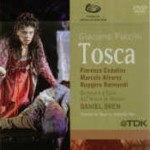This production, recorded in July, 2006, is designed and directed by Hugo de Ana, and though it contains the usual gargantuan-ism that every Verona production requires, its ideas and look are appropriate and gripping. The church of Rome and political power go hand-in-hand, ruling over everything here; grandeur rather than austerity is paramount to keeping the people in their places. There are huge silver or wooden crucifixes in each scene, a giant hand grasps a rosary, a sword looms over the action, a 40-foot high sculptured head of an emperor (Constantine?) looks blindly down on the action. The Te Deum procession is meant to dazzle and it does; Cavaradossi’s execution features a whole brigade of marksmen; Scarpia’s and Tosca’s costumes are lavish and heavy. Movements are in the grand manner, and at the close we do not see Tosca leap to her death. She races to the uppermost point of the set and is seen there, in profile, dramatically clutching a large cross as the scene goes black.
Occasionally you realize that there are simply too many things on the stage and that the characters have to walk around them awkwardly; but mostly they offer details that help to fill out the picture. Director for TV Loreena Kaufmann does her best to focus on important actions and reactions, pulling back often enough for us to (almost) appreciate the hugeness of the scene.
Fiorenza Cedolins, in the title role, is far more interesting here than she was in the Andrea Bocelli recording of the opera a few years ago. The voice remains somewhat generic; it isn’t one that can be recognized after hearing just a few notes. But she’s full of temperament, has all the notes, and carries herself like a Tosca should, with poise and the certainty that comes with the title “prima donna”.
Marcelo Alvarez as Cavaradossi adds another fine role to his ever-growing repertoire. The voice always responds as it should, and he is by turns the fiery rebel and ardent lover, singing with shading and handsome tone. And he makes the most of the role physically as well. The veteran Ruggero Raimondi, through some miracle, is singing just as well as he did 10 or 15 years ago and is still capable of an audible sneer. Perhaps the voice is a bit dryer than before but it has lost little of its power and he’s a nasty, vicious Scarpia whose pleasure in tormenting Tosca is very clear indeed. Fabio Previati is of a different mold from most Sacristans–young and clear of voice and demeanor–and Marco Spotti exhibits a dark, bass sound as Angelotti. Ottavia Dorrucci’s pure treble is a delight as the shepherd. Daniel Oren leads the Verona forces effectively with a tough, driving edge.
Perhaps no new ground is broken in this performance, but it’s a grand show and a successful presentation of this wildly melodramatic work. As a first choice DVD Tosca I’d go with the newly released Malfitano/Terfel performance from Amsterdam on Decca.
































